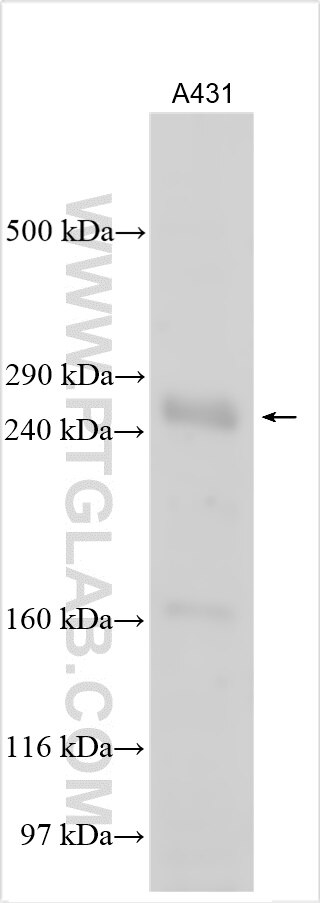Tested Applications
| Positive WB detected in | A431 cells |
Recommended dilution
| Application | Dilution |
|---|---|
| Western Blot (WB) | WB : 1:500-1:1000 |
| It is recommended that this reagent should be titrated in each testing system to obtain optimal results. | |
| Sample-dependent, Check data in validation data gallery. | |
Product Information
20029-1-AP targets MED13-Specific in WB, ELISA applications and shows reactivity with human, mouse, rat samples.
| Tested Reactivity | human, mouse, rat |
| Host / Isotype | Rabbit / IgG |
| Class | Polyclonal |
| Type | Antibody |
| Immunogen | Peptide Predict reactive species |
| Full Name | mediator complex subunit 13 |
| Calculated Molecular Weight | 239 kDa |
| Observed Molecular Weight | 240-250 kDa |
| GenBank Accession Number | NM_005121 |
| Gene Symbol | MED13 |
| Gene ID (NCBI) | 9969 |
| RRID | AB_3085595 |
| Conjugate | Unconjugated |
| Form | Liquid |
| Purification Method | Antigen affinity purification |
| UNIPROT ID | Q9UHV7 |
| Storage Buffer | PBS with 0.02% sodium azide and 50% glycerol , pH 7.3 |
| Storage Conditions | Store at -20°C. Stable for one year after shipment. Aliquoting is unnecessary for -20oC storage. 20ul sizes contain 0.1% BSA. |
Background Information
MED13, also named as ARC250, KIAA0593, THRAP1 and TRAP240, belongs to the Mediator complex subunit 13 family. MED13 is a component of the Mediator complex, a coactivator involved in the regulated transcription of nearly all RNA polymerase II-dependent genes. Mediator functions as a bridge to convey information from gene-specific regulatory proteins to the basal RNA polymerase II transcription machinery. Mediator is recruited to promoters by direct interactions with regulatory proteins and serves as a scaffold for the assembly of a functional preinitiation complex with RNA polymerase II and the general transcription factors. This antibody is specific to MED13. It has no cross reaction to MED13L.
Protocols
| Product Specific Protocols | |
|---|---|
| WB protocol for MED13-Specific antibody 20029-1-AP | Download protocol |
| Standard Protocols | |
|---|---|
| Click here to view our Standard Protocols |



